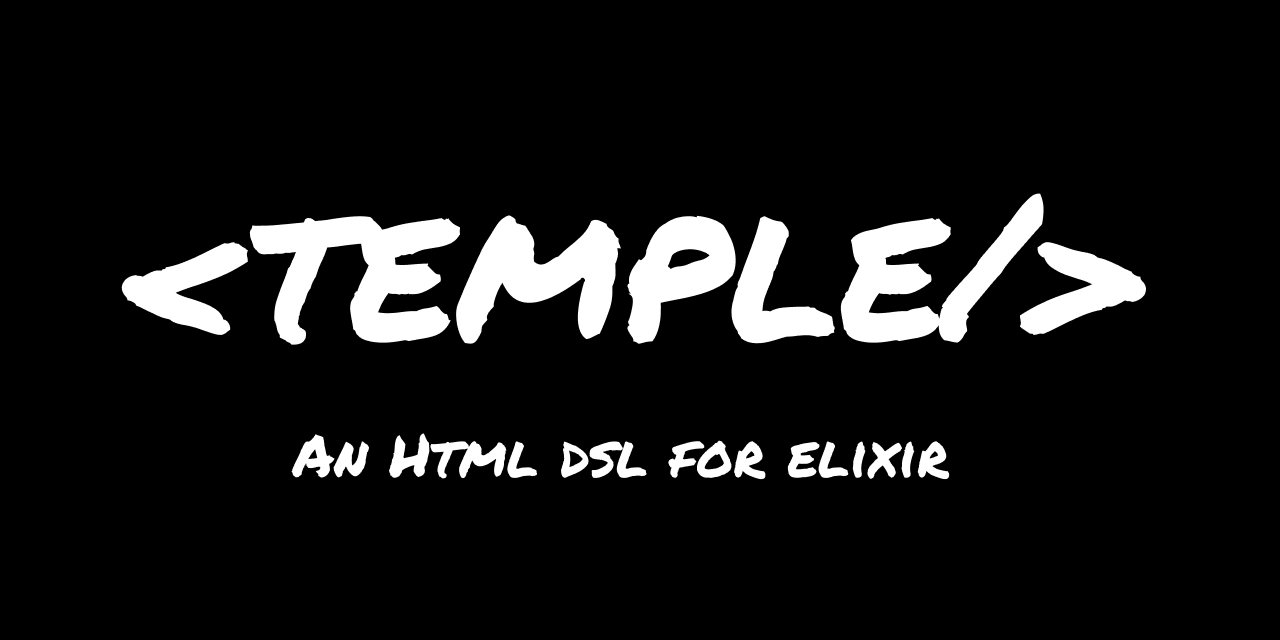| .github | ||
| bin | ||
| config | ||
| guides | ||
| integration_test/temple_plug_demo | ||
| lib | ||
| test | ||
| .formatter.exs | ||
| .gitignore | ||
| .tool-versions | ||
| CHANGELOG.md | ||
| LICENSE | ||
| mix.exs | ||
| mix.lock | ||
| README.md | ||
| temple-github-image.png | ||
| temple.png | ||
You are looking at the README for the main branch. The README for the latest stable release is located here.
Temple is an Elixir DSL for writing HTML.
Installation
Add temple to your list of dependencies in mix.exs:
def deps do
[
{:temple, "~> 0.9.0-rc.0"}
]
end
Goals
Currently Temple has the following things on which it won't compromise.
- Will only work with valid Elixir syntax.
- Should work in all web environments such as Plug, Aino, Phoenix, and Phoenix LiveView.
Usage
Using Temple is as simple as using the DSL inside of an temple/1 block. The runtime result of the macro is your HTML.
See the guides for more details.
import Temple
temple do
h2 do: "todos"
ul class: "list" do
for item <- @items do
li class: "item" do
div class: "checkbox" do
div class: "bullet hidden"
end
div do: item
end
end
end
script do: """
function toggleCheck({currentTarget}) {
currentTarget.children[0].children[0].classList.toggle("hidden");
}
let items = document.querySelectorAll("li");
Array.from(items).forEach(checkbox => checkbox.addEventListener("click", toggleCheck));
"""
end
Components
Temple components are simple to write and easy to use.
Unlike normal partials, Temple components have the concept of "slots", which are similar Vue. You can also refer to HEEx and Surface for examples of templates that have the "slot" concept.
Please see the guides for more details.
defmodule MyAppWeb.Component do
import Temple
def card(assigns) do
temple do
section do
div do
slot :header
end
div do
slot :default
end
div do
slot :footer
end
end
end
end
end
Using components is as simple as passing a reference to your component function to the c keyword.
import MyAppWeb.Component
c &card/1 do
slot :header do
@user.full_name
end
@user.bio
slot :footer do
a href: "https://twitter.com/#{@user.twitter}" do
"@#{@user.twitter}"
end
a href: "https://github.com/#{@user.github}" do
"@#{@user.github}"
end
end
end
Engine
By default, Temple will use the EEx.SmartEngine that is built into the Elixir standard library. If you are a web framework that uses it's own template engine (such as Aino and Phoenix/LiveView, you can configure Temple to it!
# config/config.exs
config :temple,
engine: Aino.View.Engine # or Phoenix.HTML.Engine or Phoenix.LiveView.Engine
Formatter
To include Temple's formatter configuration, add :temple to your .formatter.exs.
[
import_deps: [:temple],
inputs: ["*.{ex,exs}", "priv/*/seeds.exs", "{config,lib,test}/**/*.{ex,exs,lexs}"],
]
Phoenix
To use with Phoenix, please use the temple_phoenix package! This bundles up some useful helpers as well as the Phoenix Template engine.

